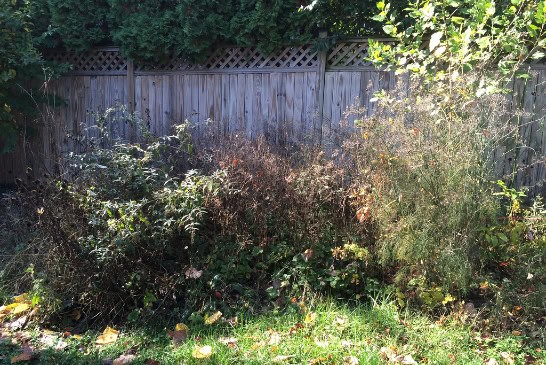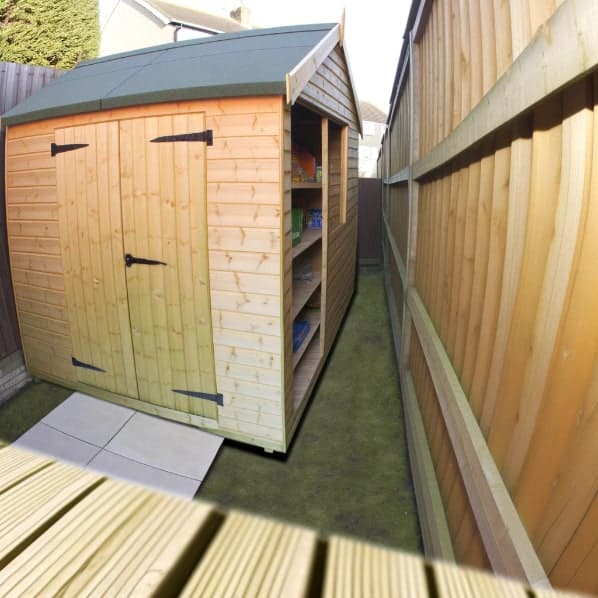Jump to:
Working on your garden can be fun and rewarding, until it leads to tension with the next door. Even small changes can spark drama—and it’s good to be aware of what could set it off before it happens.
This guide lists the typical garden disputes and helps you be a good neighbour. It also covers how to avoid potential lawsuits; you wouldn’t want to reach that point, would you?
Overgrown Hedges and Trees

This happens when your own or a neighbour’s tree or hedges grow too tall or wide. Blocking light and encroaching onto the other side of the boundary are a few issues that could come up.
Whether it’s your fault or theirs, it’s best to sort it out before the council steps in. If it’s causing problems, a complaint may be needed, especially if it meets most, if not all, of the following:
- Affecting your enjoyment of your home or garden because it’s too tall, or vice versa. That’s often when things turn into a formal dispute.
- Two or more evergreen or semi-evergreen trees or shrubs. These types of plants don’t lose their leaves in winter. If they’re too tall or dense, they can block light and views year-round, not just in summer. (Note: a hedge is considered two or more evergreen or semi-evergreen trees or shrubs.)
- Over 2 metres tall. They can be considered as a legal nuisance under the Anti-social Behaviour Act 2003, Part 8. It says that if you’re affected by the hedge, you can make a formal complaint to your local council. However, you can only do so after you’ve tried to sort it out informally with your neighbour. If the hedge is yours, your neighbour could do the same if you can’t agree.
Boundary Lines (aka Fence)

Garden boundary dispute comes up a lot between neighbours, where it’s not clear where the boundary actually is. This is especially true if old fences have been replaced over the years or the property deeds aren’t clear.
It can also get tricky when someone builds on or near a shared space. For instance, putting up a shed near a fence, or adding a garden room like a log cabin or summer house. Building on a shared driveway without checking first can also cause problems, particularly if it takes up space that both parties have a right to use.
What you can do (and what might happen on both sides):
- Talk it through. If it’s not clear, speak to your neighbour first before doing anything.
- Check the property deeds or title plan. This can show who owns the boundary or if it’s shared. The “T” mark usually indicates who’s responsible for maintaining the fence or wall. Both sides should have a proper look at this before assuming anything.
- Shared driveways. These normally come with access rights for both parties, written into the deeds. If one of you builds on or blocks it, the other may have grounds to raise a formal complaint or even take legal action.
- If needed, get advice. If talks break down, either side can speak to a solicitor, bring in a surveyor to confirm the boundary. Go this route before things get out of hand.
Shared Gardens and Paths

This is one of the common garden neighbour disputes, specifically in terraced houses. For one, it’s common for gardens or paths to be shared in these homes.
The problems often crop up when either you or your neighbour isn’t keeping their side of the shared space in check. Or, when there’s a disagreement about how the space should be used. For instance, one of you might block a path or make changes to the garden without talking it through first.
Please avoid doing any of these for your peace of mind. If it’s the other side’s problem, chat with your neighbour to agree on maintenance and use of the shared space. If it’s a bigger issue, putting something in writing can help avoid confusion down the line.
When talks aren’t working, check the deeds first. If that doesn’t settle it, speaking to a solicitor or using a mediator can help keep things from going further. In some cases, especially in leasehold properties, you may need to consult your landlord or managing agent about shared areas.
Dangerous and Non-native Weeds
Weeds can quickly get out of hand, especially if they’re invasive. Varieties, like brambles or bindweed, can even take over fences and flower beds if left alone.
Non-native and invasive weeds like Japanese knotweed are also a bigger problem. Under the Wildlife and Countryside Act 1981, Section 14 (2), it’s not illegal to have knotweed, but it is an offence to let it spread onto someone else’s land.
If you’re dealing with it (or worried it’s coming from your side), here’s what to keep in mind:
- Talk to your neighbour first if you spot an issue, especially if the plants are coming from their side.
- Keep your garden under control, so nothing invasive spreads from your side either.
- Professional removal might be needed if it’s something serious like Japanese knotweed.
- Document the problem with photos and dates if the neighbour isn’t taking action.
- Contact your local council if all else fails. Better yet, seek legal advice, especially if there’s damage or risk involved.
Garden Noise Complaints
Garden noise is one of the most common reasons neighbours fall out in the UK. It’s not that you can’t enjoy your own space, but if it’s loud and happening all the time—that’s when people start to get fed up. Whether it’s music, parties, power tools, or even shouting.
If you’re neighbour is to blame, they might not realise it’s a problem. A calm chat can go a long way. If it carries on, raise it with your local authority. Councils deal with noise complaints under ‘statutory nuisance’ laws. They may investigate and, if necessary, take action.
And if you’re the one causing the issue? It’s better to deal with it early on, before it starts causing tension. Having a BBQ party or doing some woodworking in your garden workshop? Be mindful of the time and volume.
Also, let your neighbours know when planning something a bit louder. Both sides should try to be reasonable.
Tip: Our guide to garden soundproofing has more ideas, so your peace in your outdoor space isn’t disturbed.





